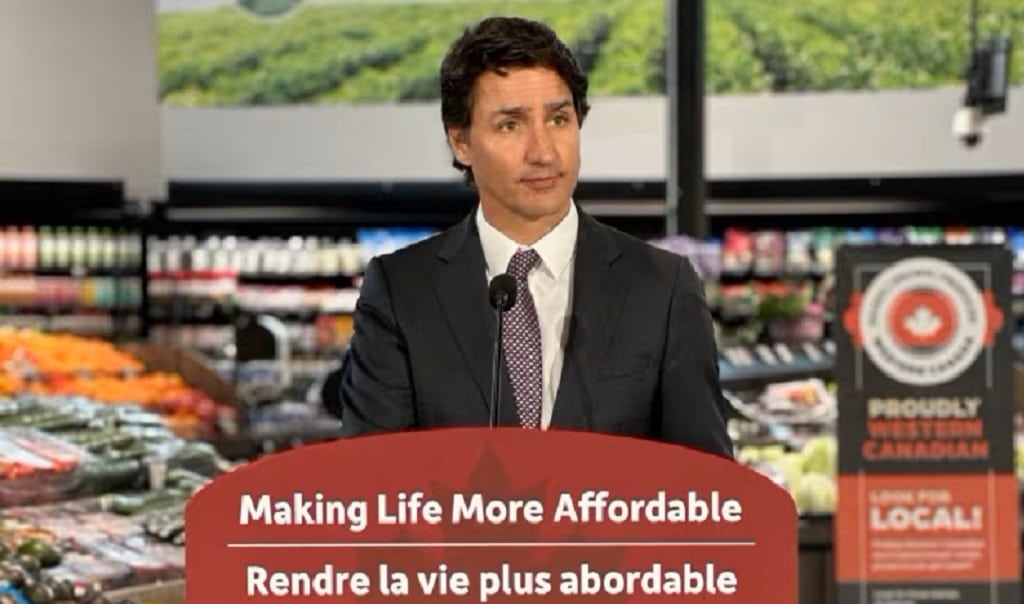Politics
Trudeau’s Latest Bid to Fight Rising Food Prices Deemed Political Theatre

Canada’s Prime Minister Trudeau is being called out his latest plan to fight high grocery prices as just another ghost of broken promise. It was a shocking move of political self-preservation by Trudeau, a realization that his iron grasp on the caucus was loosening, with electoral disaster looming in the polls.
After all, here is a prime minister who can be assaulted with bad news and pretend to hear only the Hallelujah Chorus while tiptoeing through tulip fields.
That’s a necessary talent for someone who has to deal with enough prime ministerial rage and personal detest to throw any ordinary mortal into a fetal position, wailing for a mother hug.
But, at the Liberal caucus conference this week, Trudeau finally faced reality.
He is unapologetic about his failure to move quickly on affordable housing, claiming that conditions have changed enough that enforcing a failed 2015 Liberal pledge to rebate the federal GST on rental home construction now makes sense.
As any aspiring homeowner would tell you, this is a bovine-enhanced fertilizer. The housing issue has been present for years and has worsened progressively while the federal government has been inactive for eight years.
But, fresh from another disaster in Delhi, it appeared to be a bit humbled Trudeau who came to repeatedly thank his MPs and announce something resembling an action plan.
A prime leader infamous for being deaf to caucus concerns listened to MPs who warned of dire implications if the housing and cost-of-living issues were ignored any longer.
Of course, given the absence of innovative ideas for immediate implementation, Trudeau borrowed from others.
He claimed the GST exemption for rental housing, a move leaked just minutes before the Conservatives did and an idea that the NDP has supported for years.
An hour after CTV News’ Rachel Aiello reported that the NDP leader would introduce legislation to empower the Competition Bureau to combat price gouging, Trudeau informed MPs of intentions to toughen the Competition Act for similar goals.
Trudeau reverted to his normal, same-old answer to any crisis: he asked for a consultation. Enter grocery store executives, who will be called to a two-week meeting to demand price consistency in their stores. Or else. Best of luck with it. They’ve previously been on the MP hot seat with little discernible consequence at the checkout.
However, Trudeau and his ministers have warned that this time would be different. Unspecified “consequences” will be imposed if unspecified “meaningful action” on prices is not delivered.
Will price controls be applied if they continue to defy the government and raise prices? Will the government lower the gasoline carbon tax if the chains blame high petrol prices? And what prohibits chains that reject a pricing freeze from passing along any government tax penalties? Short answers: no, no, and no.
Of course, the obvious bottom-line question is: Will any of these initiatives arrest the Liberals’ polling decline?
Nobody knows for certain. However, by the time future renters move into any housing developed thanks to the GST rebate, Canadians will have long since voted.
Food retailers can promise cost cuts only to shift prices around to maintain their successful bottom line in ways no government could ever monitor.
But it’s a start, with Trudeau having his conversion experience in front of a dissatisfied caucus who still needs to be ready to revolt against their leader.
They compelled their boss to emerge from his typical thinking bubbles and reveal old, new, borrowed or Tory blue policies.
They also thanked Trudeau for pledging more announcements on the contentious issues. He simply needs to wait for the opposing parties to come up with proposals.





























